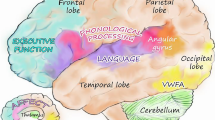Abstract
Fifth-graders identified as “poor readers” were randomly assigned to a self-management or a modeling control condition. The self-management treatment consisted of a slightly modified version of Meichenbaum's (Meichenbaum & Goodman, 1971) self-instructional procedure, i.e., five sequential steps during which task-oriented verbalizations were gradually faded to covert speech. The modeling control condition resembled a tutorial session, with the instructor modeling self-management task-approach behaviors without prompting subjects to perform them. All subjects were exposed to the same materials, tasks, and trainers, who were kept “blind” regarding the purpose of the study. The results indicated that students receiving self-management training performed better than the control group on a reading task. Moreover, self-management subjects committed fewer errors and manifested greater inhibitory control over their behavior on a measure of sustained attention. A postexperimental transfer measure of children's teaching style of a peer who had not participated in the study furthermore showed that only the experimental subjects consistently employed varied aspects of the self-management program.
Similar content being viewed by others
References
Ayllon, T., & Roberts, M. D. Eliminating discipline problems by strengthening academic performance.Journal of Applied Behavior Analysis 1974,7 71–76.
Bender, N. Self-verbalization versus tutor verbalization in modifying impulsivity.Journal of Educational Psychology 1976,68 347–354.
Birch, R. W.Attention span, distractibility and inhibitory potential of good and poor readers. Unpublished doctoral dissertation, University of Wisconsin, 1967.
Bornstein, P. H., & Quevillion, R. P. The effects of a self-instructional package on overactive preschool boys.Journal of Applied Behavior Analysis 1976,9 179–188.
Douglas, V. I. Stop, look and listen: The problems of sustained attention and impulse control in hyperactive and normal children.Canadian Journal of Behavioral Sciences 1972,4 259–282.
Douglas, V. I., Parry, D., Marton, P., & Garson, C. Assessment of cognitive training program for hyperactive children.Journal of Child Psychology 1976,4 389–410.
Gilmore, J. The factor of attention in underachievement.Journal of Education 1968,150 41–66.
Keogh, B. K., & Margolis, J. S. A component analysis of attentional problems of educationally handicapped boys.Journal of Abnormal Child Psychology 1976,4 349–359.
Luria, A. R.The role of speech in the regulation of normal and abnormal behavior. New York: Pergamon, 1961.
Luria, A. R. Speech development and the formation of mental processes. In M. Cole & I. Maltzman (Eds.),A handbook of contemporary Soviet psychology. New York: Basic Books, 1969.
Malamuth, Z. N.Self-management training for children with reading problems: Effects on reading performance and sustained attention. Unpublished doctoral dissertation, University of California, Los Angeles, 1977.
Margolis, J. S.Academic correlates of sustained attention. Unpublished doctoral dissertation, University of California, Los Angeles, 1972.
Meichenbaum, D., & Goodman, J. The developmental control of operant motor responding by verbal operations.Journal of Experimental Child Psychology 1969,7 553–565. (a)
Meichenbaum, D., & Goodman, J. Reflection-impulsivity and verbal control of motor behavior.Child Development 1969,40 785–797. (b)
Meichenbaum, D., & Goodman, J. Training impulsive children to talk to themselves: A means of developing self-control.Journal of Abnormal Psychology 1971,77 115–126.
O'Leary, K. D., Becker, W. C., Evans, M. B., & Saudargas, R. A. A token reinforcement program in a public school: A replication and systematic analysis.Journal of Applied Behavior Analysis 1969,2 3–13.
Palkes, H., Stewart, M., & Freedman, J. Improvement in maze performance of hyperactive boys as a function of verbal training procedures.Journal of Special Education 1971,5 337–342.
Silverman, M., Davids, A., & Andrew, J. M. Powers of attention and academic achievement.Perceptual and Motor Skills 1963,17 243–249.
Vygotsky, L. S. [Thought and language] (E. Hanfmann & G. Vakar, Trans.). Cambridge, Massachusetts: M.I.T. Press, 1962.
Winett, R. A., & Winkler, R. C. Current behavior modification in the classroom: Be still, be quiet, be docile.Journal of Applied Behavior Analysis 1972,5 499–504.
Author information
Authors and Affiliations
Additional information
This study was undertaken as part of a doctoral dissertation submitted at the University of California, Los Angeles. The author would like to thank Dr. Barbara Henker of the psychology department, UCLA, for her valuable guidance throughout the varied phases of the research project.
Rights and permissions
About this article
Cite this article
Malamuth, Z.N. Self-management training for children with reading problems: Effects on reading performance and sustained attention. Cogn Ther Res 3, 279–289 (1979). https://doi.org/10.1007/BF01185968
Issue Date:
DOI: https://doi.org/10.1007/BF01185968




